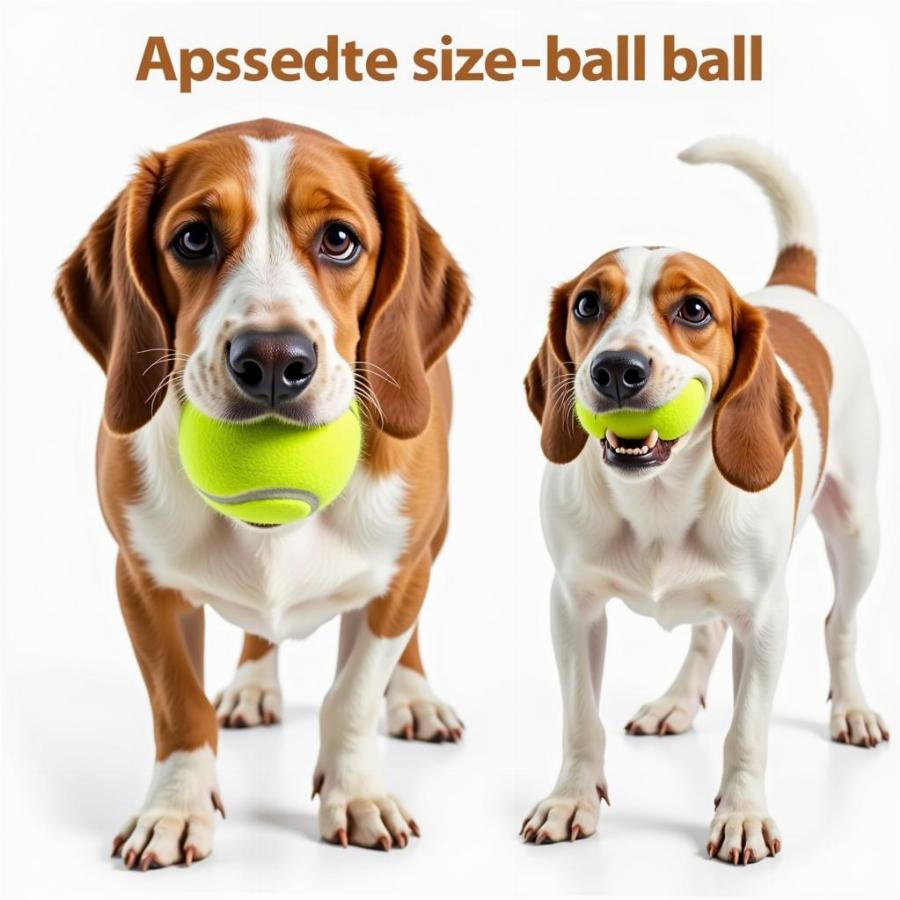Tennis balls are a classic dog toy, and for good reason. Many dogs adore the bouncy, fuzzy sphere, making them a popular choice for fetch, playtime, and even solo chewing. But are all tennis balls created equal when it comes to canine companions? This guide dives deep into the world of tennis balls for dogs, exploring everything from choosing the right size to understanding potential hazards and alternative options.
Choosing the Right Tennis Ball for Your Dog
Not all tennis balls are suitable for every dog. Factors like size, age, and chewing habits play a significant role in determining the ideal ball. For smaller dogs, standard tennis balls can be too large and cumbersome. Opt for smaller sized tennis balls or even miniature versions designed specifically for toy breeds. Conversely, larger breeds might benefit from larger tennis balls to prevent accidental swallowing.
For puppies with developing teeth, softer tennis balls can be a good choice. These are generally made from a less abrasive felt and have a gentler bounce. Senior dogs with weaker jaws may also appreciate this softer option. However, for powerful chewers, standard tennis balls may not last long. Look for heavy-duty tennis balls specifically designed for aggressive chewers or explore alternative options like rubber balls or durable chew toys.
Are Tennis Balls Safe for Dogs?
While tennis balls offer plenty of fun, they do pose some potential hazards. The fuzzy felt covering can act like sandpaper on a dog’s teeth, gradually wearing down enamel over time. This is especially concerning for dogs who are avid chewers. Additionally, if a dog manages to tear off pieces of the felt and ingest them, it can cause intestinal blockage, requiring veterinary intervention.
Another safety concern is the potential for choking. Smaller dogs are particularly at risk of swallowing a standard-sized tennis ball. Always supervise your dog during playtime with tennis balls and remove the ball if it becomes damaged or too small.
Alternatives to Tennis Balls for Dogs
If you’re looking for alternatives to tennis balls, there are several great options available. Rubber balls are a durable and long-lasting choice, and they come in various sizes, textures, and densities. Some even float, making them perfect for water-loving dogs. Rope toys can provide a satisfying chewing experience and help clean teeth, although supervision is still important to prevent swallowing of frayed ends.
For dogs who love the bounce and chase of a tennis ball but need a safer alternative, consider specially designed dog balls made from non-toxic rubber or other durable materials. These often come in bright colors for increased visibility and offer a similar playful experience without the same risks.
What Size Tennis Ball is Best for My Dog?
Determining the right size depends on your dog’s breed and size. A smaller dog may choke on a standard-sized tennis ball. For small dogs, choose miniature tennis balls. For medium to large dogs, standard tennis balls are usually fine. For giant breeds, consider extra-large tennis balls to prevent swallowing.
 Dog with Correct Tennis Ball Size
Dog with Correct Tennis Ball Size
Why Do Dogs Love Tennis Balls So Much?
The appeal of tennis balls lies in their bouncy texture, bright color, and fuzzy felt. These factors stimulate a dog’s prey drive and natural instincts to chase and retrieve. The squeak of some tennis balls can also add to the fun, further engaging a dog’s playful nature.
How to Make Tennis Balls Last Longer
To extend the life of your dog’s tennis ball, consider buying heavy-duty versions designed for aggressive chewers. Rotate toys to prevent boredom and excessive focus on one ball. Regularly inspect the ball for damage and discard it if it becomes too worn or small pieces are coming off.
Conclusion
Tennis balls can be a fun and engaging toy for dogs, but it’s important to choose the right size and be mindful of potential hazards. By understanding the risks and exploring alternatives, you can ensure your furry friend enjoys playtime safely. Remember to always supervise your dog with tennis balls and prioritize their health and well-being.
FAQs
- Can my dog play with a tennis ball unsupervised? No, it’s not recommended to leave a dog unsupervised with a tennis ball due to choking hazards and potential ingestion of the felt covering.
- What should I do if my dog swallows a piece of a tennis ball? Contact your veterinarian immediately.
- Are there tennis balls specifically designed for dogs? Yes, there are heavy-duty and non-abrasive tennis balls available that are designed for dogs.
- How often should I replace my dog’s tennis ball? Replace the ball as soon as it becomes damaged or shows signs of wear.
- What are some good alternatives to tennis balls for dogs? Rubber balls, rope toys, and durable dog-specific balls are excellent alternatives.
- Can puppies play with tennis balls? Yes, but opt for softer tennis balls designed for puppies to protect their developing teeth.
- Are tennis balls bad for senior dogs? Senior dogs with weaker jaws may benefit from softer tennis balls.
Related Articles on Beaut Dogs:
- tennis balls for dogs
- large tennis ball for dogs
- dogs and tennis balls
- why do dogs love tennis balls
Beaut Dogs is your one-stop resource for all things related to dog care. We provide expert advice and helpful tips on a wide range of topics, from breed selection to nutrition and training. For personalized guidance, contact us at [email protected]. We’re here to help you provide the best possible care for your beloved canine companion.